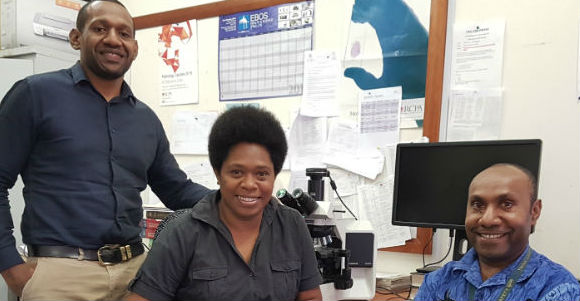Image: The ePathPG medical specialists, Dr Joe Norie, Dr Jacklyn Joseph and Dr Rodney Itaki
By Kevin McQuillan
Trials have begun of a way to use the internet to improve the diagnosis of cancer biopsies. It is another PNG innovation that has grown out of the KumulGamechangers Competition, as entrant co-founder, Dr Rodney Itaki, explains to Business Advantage PNG.
A Lecturer in Pathology at the University of PNG Medical School, Dr Rodney Itaki is the co-founder of a team of three health professionals and a software developer. They are trialing in the digital environment a way to provide cheap, easy access to cancer diagnosis and advice.
Called ePathPG (‘ePathway for PNG’), the prototype version takes digital microscopic images of tissues for cancer diagnosis.
‘The images are captured using a digital microscope, with smartphones attached to an ordinary microscope,’ Dr Itaki tells Business Advantage PNG.
‘The trial is using biopsy tissues from the mouth, cervix, endometrium or breast to diagnose cancers arising from these tissues.
‘It will have a great, positive, impact on cancer diagnosis in PNG … Patients will get their results faster, allowing earlier and faster interventions and leading to better outcomes for cancer sufferers in PNG.
‘Initial trials have been very good.’
Benefits

ePathPG Software Developer, Clint Napo
Beneficiaries include women who undergo examination and testing for cervical cancer, breast cancer biopsies, endometrial biopsies and patients undergoing mouth cancer screening.
It will also help with testing of pregnant mothers: digital ultrasound images can be used to detect potential complications, so that high risk pregnancies can be managed effectively.
ePathPG creates digital microscopic images of samples using a smartphone. It can also be used to diagnose anaemia, malaria, filariasis, leukemia, lymphoma and other blood disorders, says Itaki.
Specialist team
Dr Itaki, from Enga Province, trained in PNG then had post-graduate training in Japan, Australia and Singapore. He has worked for the last 10 years in the public service, private practice, NGOs, the oil & gas industry, the mining industry and academia.
Dr Jacklyn Joseph, from Morobe Province, is a specialist pathologist and working at the Port Moresby General Hospital (POMGH). Dr Joe Norrie is into his second year of specialist training to become a pathologist, and is also working at POMGH.
‘Clint Napo is the other co-founder. He’s a software developer and wrote the source code for the product’.
‘I came up with the original concept and submitted my proposal to the KumulGamechangers competition. I met Clint at the KumulGamechangers training workshop and we teamed up. Then we needed to widen our team so we asked two other doctors to join the team.’
KumulGamechangers
The KumulGamechangers (KGC) initiative, initiated and implemented by the Kumul Foundation, is funded by the Australian Department of Foreign Affairs, the United Nations Development Program and the PNG Business Council, says KGC Chairman, Anthony Smare.
‘Selected entrepreneurs underwent training with Silicon Valley experts and attended a boot-camp on how to build a startup.’
The project—first of its kind in PNG—received more than 680 ideas, of which 42 best ideas were shortlisted,’ UNDP spokesman, Assel Tleof, tells Business Advantage PNG. Twelve made it to the finals.
‘Selected entrepreneurs underwent training with Silicon Valley experts and attended a boot-camp on how to build a startup,’ says Tleof. ‘This helped them to learn the basics of start-up, build and prototype their ideas, try pitching and fundraising approaches.’
Funding
Like all good start-ups, Dr Itaki and the team are paying for the project out of their own pockets.
‘Our main expenses are mobile phone credits and car fuel,’ he says. ‘Although time is our biggest investment right now.’
‘The final product will not be expensive.’
Dr Itaki and the team are now looking for a business partner or investor (‘maybe a venture capitalist or mobile phone company’) to become a partner and inject finance to help pay for hiring other local software developers to fast track product development, and to cover the cost of the launch and a national rollout.
‘We are in the process of registering a start-up company called ‘Remote Health Solutions’.
‘The final product will not be expensive. Our pricing model will be based on subscription fees annually and tailored to the type of user: for example, individual users or institutional subscription or company subscription for multiple users.’
Copyright © 2016 Business Advantage International.


